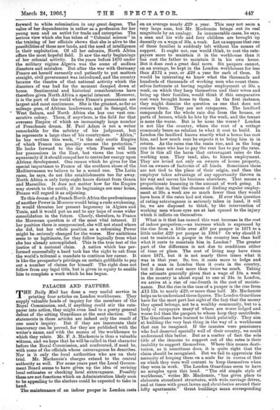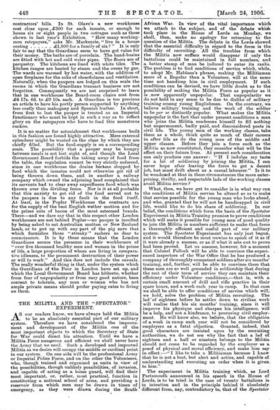PALACES AND PAUPERS.
rrHE Daily Mail has done a very useful service in .I. • printing four articles on London workhouses. They supply valuable heads of inquiry for the members of the Royal Commission, and, if anything could. stir the rate- payer into action, they might even lead to a pretty general defeat a the sitting Guardians at the next election. The statements in these articles are indeed only the result of one man's inquiry. But if they are inaccurate their inaccuracy can be proved, for they are published with the writer's name, and with the names of the workhouses to which they relate. Mr. F. A. Mackenzie is thus a valuable witness, and we hope that he will be called in that character before the Royal Commission, and confronted, if need be, with some of the officials whose extravagance he describes. Nor is it only the local authorities who are on their trial. Mr. Mackenzie's charges extend to the central authority as well. For some years past the Local Govern- ment Board seems to have given up the idea of revising local estimates or checking local extravagance. Possibly these are not functions which an Administration likely soon to be appealing to the electors could be expected to take in hand.
The maintenance of an indoor pauper in London costs on an average nearly £29 a year. This may not seem a very large sum, but Mr. Mackenzie brings out its real magnitude by an analogy. In innumerable cases, he says, a man and his wife and four children are brought up decently on a wage of 30s. a week. Let us suppose that one of these families is suddenly left without the means of support. It ought not, one would think, to cost the rate- payers more to maintain it in the workhouse than it has cost the father to maintain it in his own home. But it does cost a great deal more. Six paupers cannot, on an average, be kept in the London workhouses for less than £172 a year, or £28 a year for each of them. It would be interesting to know what the thousands and hundreds of thousands of working men who count them- selves fortunate at having regular employment at 30s. a week, on which they keep themselves and their wives and bring up their families, would think if this comparative cost were brought home to them. In the first instance, they might dismiss the question as one that does not concern them. They are not ratepayers. The landlord compounds for the whole rate due from the houses, or parts of houses, which he lets by the week, and the tenant is none the worse. But is he none the worse ? London is not like the country, where the rent of a cottage commonly bears no relation to what it cost to build. In London the landlord knows exactly what a house has cost him, and how much rent he expects it to bring him in in return. As the rates rise the rents rise, and in the long run the man who has to pay the rent has to pay the rates. Nor is this all the harm that extravagant rates do the working man. They tend, also, to lessen employment. They are levied not only on owners of house property, .but on owners of factories of all kinds. Sometimes these are not tied to the place of their origin, and then the employer takes advantage of any opportunity thrown in his way and moves his business elsewhere. That means a proportionate lessening in the amount of work going. It means, that is, that the chances of finding regular employ- ment at 30s. a week are so much fewer than they would have been if the rates had not risen. If ever this question of rating extravagance is seriously taken in hand, it will be, we are disposed to think, by the intervention of working men whose eyes are at last opened to the injury which it inflicts on themselves.
What is it that has caused this vast increase in the cost of indoor pauperism,--an increase which is expressed by the rise from a little over £10 per pauper in 1871 to a little under £29 per pauper in 1904 ? Or why should it cost to maintain a pauper in the country less than half what it costs to maintain him in London ? The greater part of the difference is not due to conditions either of time or place. The cost of living may have risen since 1871, but it is not nearly three times what it was in that year. So, too, it costs more to lodge and feed a man in London than it costs in the country, but it does not cost more than twice 'as much. Taking the estimate generally given that a wage of 18s. a week in the country is about equal to one of 24s. in London, we arrive at a rise of one-fourth in the cost of mainte- nance. But the rise in the case of a pauper is the rise from £13 12s. to nearly £29, or more than half. Mr. Mackenzie helps us to understand these figures. The London Guardians have for the most part lost sight of the fact that the money they spend belongs, not to a wealthy community, but to a body of ratepayers many' of whom are worse lodged and worse fed than the paupers to whose keep they contribute. The Guardians have learned to think palatially. They aim at building the very best thing in the way of a workhouse that can be imagined. If the inmates were pensioners who had deserved specially well of their country, we could understand this better. But as a matter of fact the sole title of the iemates to support out of the rates is their inability to support themselves. Where this means desti- tution, as it sometimes does, it is quite right that the claim should be recognised. But we fail to appreciate the necessity of keeping them on a scale far in excess of that on which they were well content to keep themselves when they were in work. The London Guardians seem to have no scruples upon this head. " The old simple style of workhouse," writes Mr. Mackenzie, " has given place to elaborate stonefaced structures, with wide carriage drives, and at times with great lawns and shrubberies around their lofty apartments." Great buildings mean corresponding contractors' bills. In St. Olave's a new workhouse cost close upon .£300 for each inmate, or enough to house six or eight people in two cottages such as those shown in last year's Exhibition. " How many working- men ratepayers," asks Mr. Mackenzie, " live in a house costing £1,800 for a family of six ? " It is only fair to say that the Guardians seem to have got value for their money. The baths are of porcelain. The hand-basins are fitted with hot and cold water pipes. The floors are of parquetry. The kitchens are lined with white tiles. The kitchen ranges are heated by steam and the ovens by gas. The wards are warmed by hot water, with the addition of open fireplaces for the sake of cheerfulness and ventilation. Naturally, when the paupers are lodged on this scale the rooms in which the Guardians transact business are not forgotten. ' Consequently we are not surprised to learn that in one workhouse the Board-room chairs cost from .24 17s. 6d. to £9 10s. each. A Guardian is too precious an article to have his portly person supported by anything less costly than mahogany and Spanish leather. In short, from first to last the pauper is treated as an Imperial functionary who must be kept in such a way as to reflect glory on the ratepayers who have to feed this monstrous cuckoo.
It is no matter for astonishment that workhouses built in this fashion are found highly attractive. Mere external splendour might be wasted on the class by which they are chiefly filled. But the food-supply is on a corresponding scale. The possibility that a pauper may be hungry between meals is not lost sight of, and though the Local Government Board forbids the taking away of food from the table, the regulation cannot be very strictly enforced, since in one workhouse the drains bectune stopped by food which the inmates could not otherwise get rid of being thrown down them, and in another a railway company which owned the adjoining land complained that its servants had to clear away superfluous food which was thrown over the dividing fence. Nor is it at all probable that this anxiety to get rid of the food served out to the paupers is due to any fault in the food itself. At. least, in the Poplar Workhouse the contracts are for the supply of the best English wether mutton and for the _prime cuts of bacon of the most esteemed brands. There—and we dare say that in this respect other London workhouses are not behind Poplar—no pauper is insulted by being asked to eat Australian mutton or New Zealand lamb, or to put up with any part of the pig save that which furnishes those " streaky " rashers so dear to connoisseurs. It is by these means that the London Guardians secure the presence in their workhouses of " over five thousand healthy men and women in the prime of life, a large proportion of whom are living in compara- tive idleness, to the permanent destruction of their power or will to work." And this does not include the casuals. The really wonderful thing is that, under the system which the Guardians of the Poor in London have set up, and which the Local Government Board has hitherto, whether from fear of unpopularity or from easy good nature, been content to tolerate, any man or woman who has not ample private means should prefer paying rates to living on them.











































 Previous page
Previous page